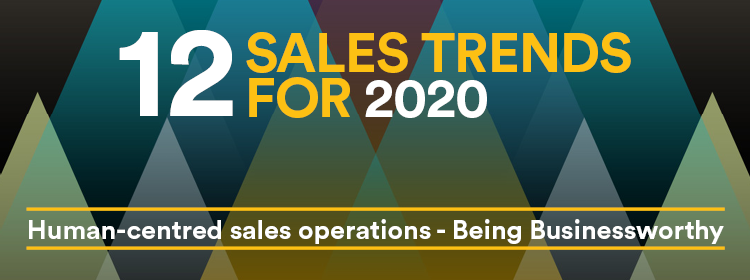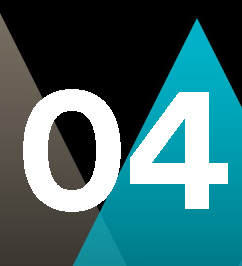
Sales trend 4 from the Barrett 12 Sales Trends Report for 2020 is about what being human-centred means for businesses.
All business people know the concept of being creditworthy. That’s about not losing other people’s money.
Enter the Business for Peace Foundation[1], established in 2007 in Oslo, Norway, which has developed the concept of Being Businessworthy.
 Being Businessworthy is about earning other people’s trust. Being Businessworthy is about recognising that in business we need to get these two curves, the “making money” curve and the “making a difference” curve, to come together. We need to make money while making a positive difference to other people; merging profit with a higher purpose, while acting ethically and responsibly.
Being Businessworthy is about earning other people’s trust. Being Businessworthy is about recognising that in business we need to get these two curves, the “making money” curve and the “making a difference” curve, to come together. We need to make money while making a positive difference to other people; merging profit with a higher purpose, while acting ethically and responsibly.
Being Businessworthy means being human-centred and purpose-led.
This shift to a more holistic approach to doing business is having a profound effect on how businesses operate, including how they set up their sales teams, sales operations and value chains.
The latest research in economics is revealing that solely focussing on profit maximisation and shareholder return is killing business, alienating customers and leading to race-to-the bottom outcomes where no one wins.
Across the world, regulators, industry and public interest groups are looking for ways to identify alternative, more sustainable models of doing business. This quest is supported by a wealth of entrepreneurial practices, initiatives and ‘experiments’ aiming to address these specific concerns.
The World Bank (WBG) defines the human-centred model for business as follows: “The Human-Centred Business Model (HCBM) is an innovative sustainable business ecosystem that provides the tools and inputs to the private sector, public authorities and consumers when developing new businesses. At the center of the model are economic, social, environmental sustainability and ethical/integrity values that can lead to more sustainable business practices.”
The WBG is one of 3 participants of the Global Forum on Law, Justice and Development (GFLJD)[2]. The GFLJD highlights that ‘many entrepreneurs are voluntarily moving towards a more sustainable way of doing business, as an answer to a growing market of buyers, consumers and responsible investors more and more sensitive to the impact of business on the social and natural environment in which they operate.’
Based on these findings, we’d say that essentially businesses can now be defined as either:
Pro-Social: behaviours and intent that benefit others or society as a whole
Pro-Selfish: lacking consideration for others and concerned with one’s own personal profit and pleasure.
While the prevailing business models, in big business at least, are still heavily weighted in the profit maximisation camp, more and more customers are demanding change – they are wanting to engage with, and buy from, human-centred, ethical businesses that take into account the Triple Bottom Line – people, profit, planet.
Able to get better visibility on the supply chain and exposure to the dubious actions of business – think Westpac’s money laundering scandal, November 2019[3] as but one recent significant example – consumers, buyers, customers, patrons, members, patients, etc. are making decisions about who they buy from and partner with based on their values, morals and business, sales and supply chain ethics, not just price.
A human-centred business model that has at its heart human-centred sales and service operations underpinned by ethical, transparent supply chain is emerging as key to business success now and into the future. While AI (artificial intelligence) will be a part of business, it cannot take over the complex human interactions that are part of day to day business, no matter how much Silicone Valley would like it to be otherwise.
Client-centred equals human-centred
But what does that really mean for sales and service?
It means that businesses need to be looking after customers, employees, suppliers, communities and the planet. Human-centred selling is the means by which we create and generate opportunity that is honourable as well as sustainable. It’s about putting humanity back on the corporate map and endorsing buying and selling experiences that treat people with dignity and respect.
If we come back to the purpose of business as defined by Peter Drucker in his work The Age of Discontinuity, 1953, “The purpose of business is NOT to make profit but to satisfy the needs and expectations of customers. The consequence of satisfied customers is incremental profit.”
This is not some new age, woke, progressive concept.
Business is an answer to human needs therefore, it is our duty to be human-centred.
What does a human-centred sales operation look like?
Human-centred business and sales operations have a purpose beyond profit maximisation. As stated above, a human-centred business and by default a human-centred sales operation is focused on being businessworthy: focused on “making money” and on “making a positive difference”.
Human-centred sales operations are also systems oriented and inclusive of the whole business; they are engineered for sustainable growth, not personality driven. This is a fundamental shift from the piecemeal or training centred approach that has been the mainstay of most sales teams and operations. Smart business leaders are recognising that they need to shift their thinking away from seeing training as the ONLY solution to selling better when the right training is a part of the solution and that this can take anywhere between 2-4 years to achieve a positive, wholesale transformation across strategy, process, people and culture but with many wins along the way.
Those businesses who’ve got it right have an inclusive Sales System in place:
- Defined Purpose – The Why
- Clear business and sales strategy – the navigation system – The Who, The What, The Why Us
- Clear Levels of Accountability – structure, role clarity, leadership – Who does What
- Defined sales and service processes – the operating system – The How
- Code of Conduct – the culture – Ethics, Values, and Standards
- Engagement and buy-in across the whole business that selling is everybody’s business
Can a human-centred sales operation exist in a business which is not human-centred?
No not really. There is a dissonance.
Despite the ‘greed is good’ mantra that sprang up in the late 1980’s most people are not single-mindedly oriented towards maximising financial gain, certainly not at the expense of others. Most people are Pro-social and want to know they are contributing to the betterment of others.
Robert H. Frank[4], the Henrietta Johnson Louis Professor of Management and a Professor of Economics at the Samuel Curtis Johnson Graduate School of Management at Cornell University states that ‘Even heads of companies may have multiple goals guiding their behavior, including a commitment to clients and staff as well as shareholders and their personal financial gain. Honesty, commitment, and loyalty are values cherished by many individuals, certainly enough that most positions of power in the economy can be staffed by ethically-motivated personnel… there is considerable empirical support for the notion that ethically motivated individuals in the business world are happier and more successful that unidimensional profit maximizers.’
Boards of Directors of organisations are being put on notice.
They are being advised that they would do better to choose leaders who are committed to a broad set of moral and material concerns rather than greed oriented leaders. This is because greed oriented individuals will do what is best for themselves, not the organisation, stakeholders, or shareholders.
Robert H. Frank states, ‘There is just no way to present a CEO with material incentives sufficient to line his/her concerns up with shareholder profit maximization’.
What this trend is highlighting at the broadest level is that societies whose business leaders have moral integrity are successful societies.
What does this mean for the future of sales operations and businesses?
We can take one of two options:
- Pro-social: Human-centred, purpose-led, systems oriented, mix of AI and human capabilities, triple bottom line, businessworthy (profitable and makes a positive difference); sustainable with short and long term benefits
- Pro-selfish: Fully automated systems, profit maximisation, no consideration for communities and the planet
The rise of organisations such as Blueprint for a Better Business, BCorps, Business for Good, and many more are a clear sign that we are moving towards better ways of operating and selling.
The answer is clear: Making a profit and benefiting people, communities and planet can coexist.
The time is NOW.
Our business and sales models need to evolve to the new business alternatives that are already here.
Remember, everybody lives by selling something.
[1] The foundation names up to seven Honourees who receive the Oslo Business for Peace Award, in recognition of their individual and outstanding businessworthy contribution to the building of trust, stability and peace. The Honourees are selected by an independent committee composed of winners of either the Nobel Peace Prize or Nobel Memorial Prize in Economic Sciences.
[2] https://globalforumljd.com/new/communities-of-practice/human-centered-business-model
[3] https://www.abc.net.au/news/2019-11-20/westpac-to-face-fines-anti-money-laundering-terrorism-breaches/11720474
[4] https://evonomics.com/role-of-morality-in-a-capitalist-economy/
Related topics
A better way of doing business
A year ago (roughly)
Avoiding a Kodak Moment: A positive Case Study on managing change for better sales & business


New Article Email Notification